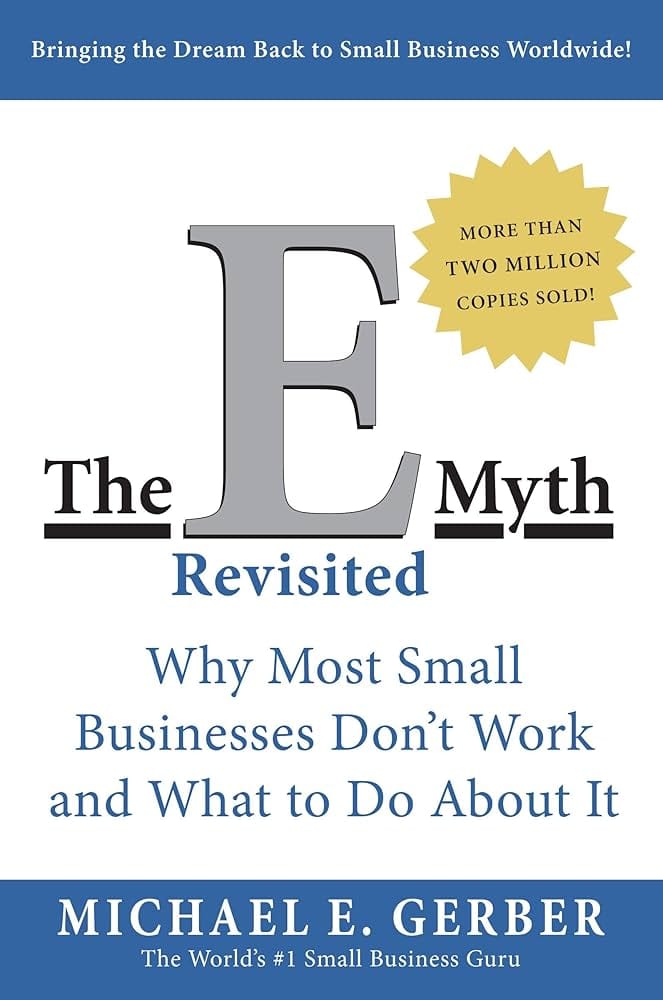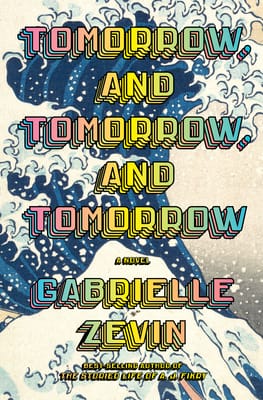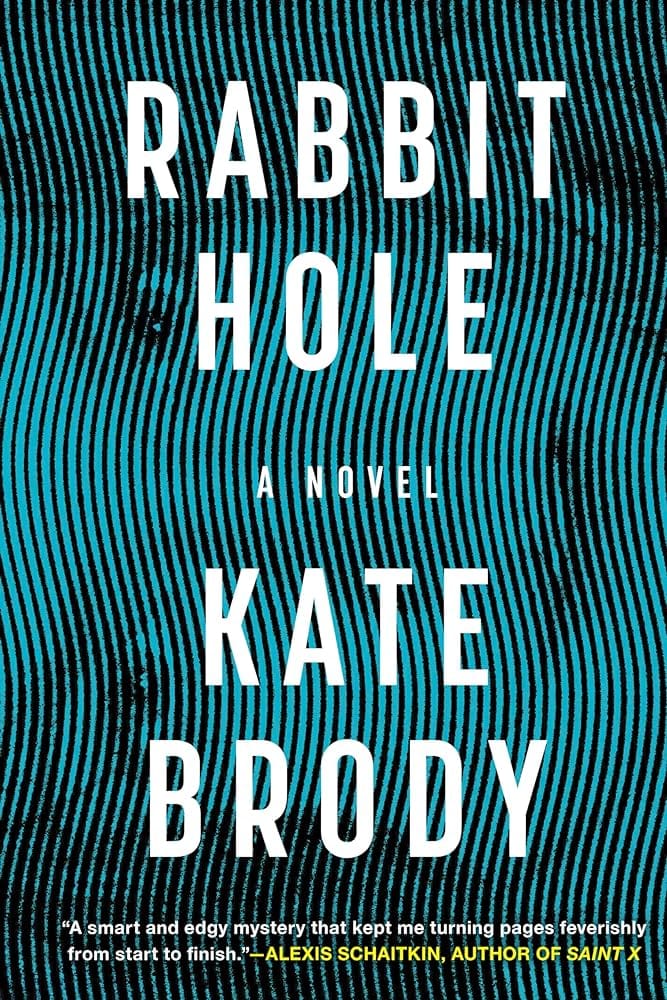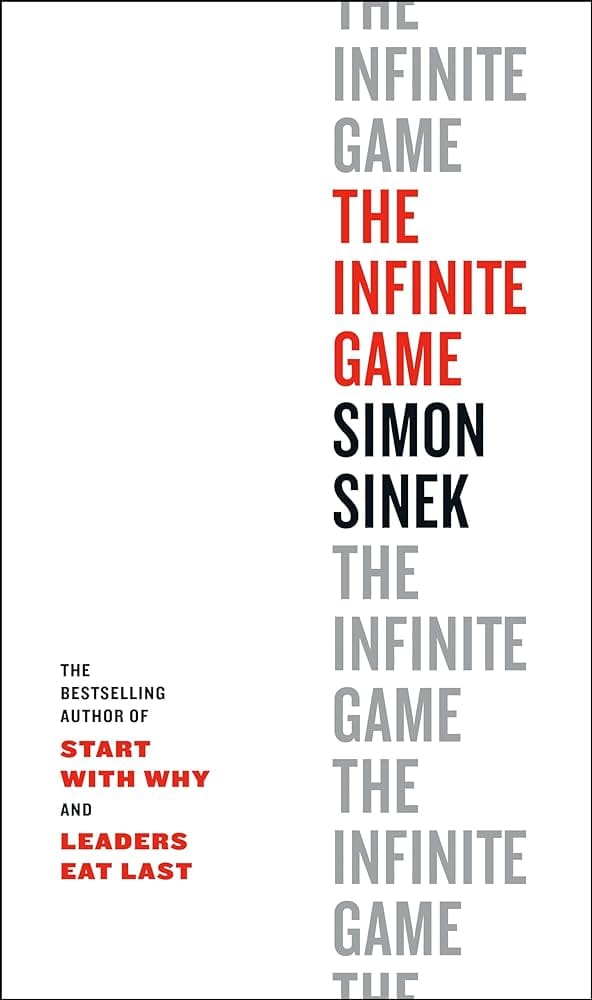
The Infinite Game
Simon Sinek offers a framework for leading with an infinite mindset. By committing to a vision of a future world so appealing, we will build it week after week, month after month, year after year.
buy this book💭 The book in 3 sentences
- Most companies and leaders operate under a finite mindset—they’re focused on short-term goals to advance their own interests. When you switch to an infinite mindset and build trusting team cultures, you can align everyone towards a Just Cause that will grow your business infinitely more.
- True trust in a team is built through open communication and accepting vulnerability. There must be a focus on will rather than resources—to build an environment where people feel supported and happy to do their best. The fostering of this environment must come from leadership. It’s not the people doing the job, it’s about the people who lead the people doing the job who can make the greater positive difference.
- Leaders must be courageous enough to stand against the status quo and innovate for the goal of working towards their Just Cause. They must be courageous enough to look at their biggest competitors and see not just competitors but worthy rivals; see their strengths as ways we can improve.
👀 Impressions
This book helped me understand the difference between operating within an infinite mindset vs a finite one and how ultimately serving a greater purpose can be beneficial for everyone in the game.
👥 Who should read it?
Although this book was written for leaders in business, there are no limits to who can benefit from this book. Whether you’re just starting in your career or you’re the CEO of a large enterprise, understanding and learning to adopt an infinite mindset will help guide your career and business towards greater success.
Read this book if you are
- looking to for a framework to focus on long-term growth
- a leader who wants to be a better leader
- someone who is currently building a new business
- someone who has been tasked to revamp an existing business
🚀 Actionable takeaways
- Identify your Just Cause and use that as the key guiding point of all of your business/career decisions
- Focus on fostering a trusting team environment when working with others
- Use the Just Cause to reevaluate how you structure your business and ensure that everything you do clearly shows that you are advancing the Just Cause
- Look at competitors in your space as “Worthy Rivals” and see their strengths as opportunities for improvement. You are both playing the game. Play with an infinite mindset and see that they’re actually pushing the industry further for you.
- See humans as humans. Investing in humans goes beyond paying them well and offering them a great place to work. They have ambitions, fears, ideas, opinions, and ultimately want to feel like they matter. Show genuine care and make them matter. When you grow people, you grow their will which will push your business further.
- Have the capacity to initiate an extreme disruption to a business’s strategy in order to more effectively advance a Just Cause. AKA be flexible enough to make an Existential Felx. You have to hold appreciation for the unpredictable and always keep your eyes on the horizon to see opportunities to arise. If you don’t blow it up, someone else will do it for you.
🗣️ Favourite quotes
“To succeed in the infinite game or business, we have to stop thinking about who wins or who’s the best, and start thinking about how to build organizations that are strong enough and healthy enough to stay in the game for many generations to come”
“The best way to drive performance in an organization is to create an environment in which information can flow freely, mistakes can be highlighted, and help can be offered and received.”
“Being the “best” is a fool’s errand, and there can be multiple players that do well at the same time,”
✏️ Summary + Notes
What is an infinite game?
Infinite games:
- are played by known and unknown players
- have no exact or agreed-upon rules
- players can generally operate however they want
- players can change how they play the game at any time, for any reason
- primary objective is to keep playing, to perpetuate the game.
Versus finite games:
- played by known players
- has fixed rules
- has agreed-upon objective that, when reached, ends the game
- always has a beginning, middle, and end
To succeed in the infinite game or business, we have to stop thinking about who wins or who’s the best, and start thinking about how to build organizations that are strong enough and healthy enough to stay in the game for many generations to come.
There are 3 factors when we decide how we lead:
- We don’t get to choose whether a particulate game is finite or infinite
- We do get to choose whether or not we want to join the game
- If we do choose to join, we can choose whether we want to play with a finite or infinite mindset
The true value of an organization is measured by the desire everyone has to contribute to the organizations ability to keep succeeding past individual tenures. An organization is adopting an infinite mindset when it considers the impact of its decisions not just on the bottom line but on its people, community, the economy, the country, and the world.
When we’re trying to adopt an infinite mindset, here are the 5 essential practices to adopt:
- Advance a Just Cause
- Build trusting teams
- Study your worthy rivals
- Prepare for existential flexibility
- Demonstrate the courage to lead
Advancing a Just Cause
Winning is a temporary and fleeting thrill but no one is able to forever hold on to that feeling. When there is a Just Cause in place, our days equate to more than just short-term wins—it starts to have more meaning and fulfillment.
A Just Cause is different than having a Why.
Your ‘Why’
- comes from the past
- is your origin story
- is a statement of who you are
- is a sum of your values and beliefs
An example of a ‘Why’ is: “to inspire people to do what inspires them so that together we can change our world for the better.”
A ‘Just Cause’ is
- about the future
- currently non-existent
- a world we hope to live in and will commit to help build
- unlike a ‘Why’ where there can only be one, we can believe and advance several Just Causes
An example of a ‘Just Cause’ is: “build a world in which the vast majority of people wake up feeling inspired, feel safe at work, and return home fulfilled at the end of the day.”
When you’re identifying a Just Cause, remember that it must be
- for something – affirmative and optimistic
- inclusive – open to all those who would like to contribute
- service-oriented – for the primary benefit of others
- resilient – able to endure political, technological, and cultural changes
- idealistic – big, bold, and ultimately unachievable
Build trusting teams
Many companies like to ask “how do I get the most out of my people?”, but that question is flawed. What you should be asking is “how do I create an environment in which my people can work to their natural best?”
What companies need to remember is that when something goes wrong, it’s not about the people doing the job. It’s about the people who lead the people doing the job who makes the greater difference. Meaning it’s up to you as a leader to prioritize people over results, which will in turn drive better results.
Often times, companies will prioritize resources over will. Resources are tangible, easily measure, and generally come from external sources. Resources typically are your revenue, profits, cash flow, and money.
Will, on the other hand, are intangible and are harder to measure. It’s the feelings people have when they come to work. It’s the people’s morale, motivation, inspiration, and commitment. This steps from internal sources such as the quality of your leadership and the clarity and strength of your Just Cause.
As an infinite leader, your job is to work hard to look beyond the financial pressures of the current day and put people before profit as much as possible. Investing in humans is more than just paying them well and offering them a place to work. It’s understanding that they are humans, and humans have ambitions, goals, fears, ideas, and opinions. They ultimately want to feel like they matter. It’s your job to make sure you create an environment where everyone respects these aspects and care about making people feel like they matter.
There’s a difference between a group of people who work together, and a group of people who trust each other.
In order to build a trusting team, you must create an environment where people feel safe expressing themselves. Keep in mind that feeling safe to express our feelings in the workplace is not the same as lacking emotional professionalism.
As a leader, your job is to help your team understand that when there’s a problem, the problem is not the individual. The problem is a challenge that the team will face together to overcome.
Study your worthy rivals
Finite leaders see their competitors as competitors and have their focus on being better and “winning”. Infinite leaders know that all competitors have strengths that can be used as inspiration and instead see them as ‘Worthy Rivals’.
Worthy rivals push us further than even our best advisors and coaches can. They help us get better at what we do. They also help us get clearer on why we do it. Take Apple and IBM for example. When IBM launched their first personal computer, Apple welcomed them. No, they literally publicly welcomed them. In fact, they bought an ad space in the newspaper to do so.
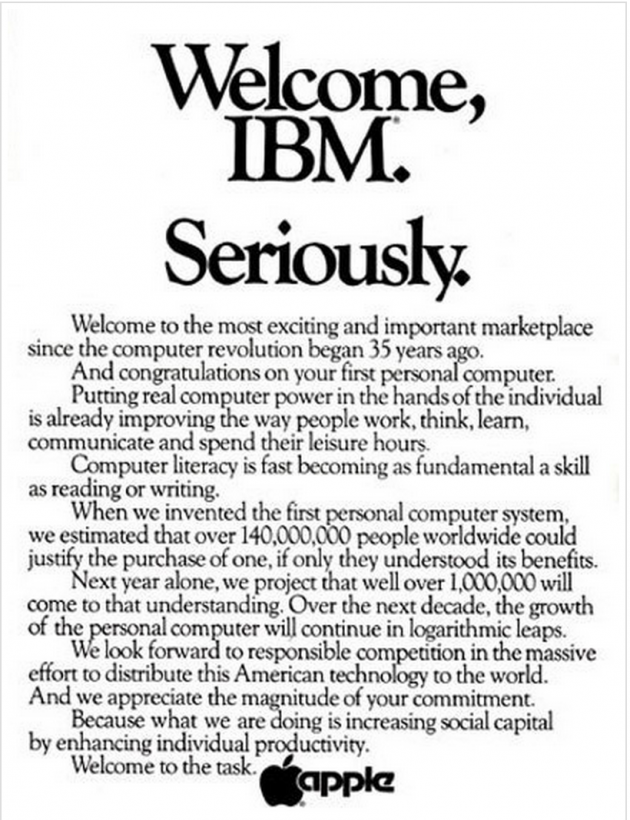
The key message in this ad is the last few lines. “Because what we’re doing is increasing social capital by enhancing individual productivity. Welcome to the task.” Apple saw that although IBM is their greatest competitor at the time, both of them were working towards a similar vision. Having another tech giant join the market would only push the market further. Having two companies both work towards advancing technology for this vision can only help the industry grow faster. Instead of seeing them as a competitor and feeling like they need to “win”, they saw them as a worthy rival—another company that will push them to grow.
Being the “best” is a fool’s errand, and there can be multiple players that do well at the same time.
Prepare for existential flexibility
Existential flexibility can be defined as having the capacity to initiate an extreme disruption to a business model or strategic course in order to more effectively advance a Just Cause. By being flexible to make these risky changes, you’re ultimately going to stay on top of innovation and keep your business in the game.
Walt Disney quite Disney and started WED, the company that created Disneyland. He did this because he wanted to create something alive and always changing and improving—something that aligned with his Just Cause.
Don’t confuse existential flex with the “shiny things syndrome”. You’re not trying to chase after the next hot new idea. You’re evaluating and analyzing the market for innovations and changes that would best help serve your Just Cause. Existential flexibility means not being afraid to make those changes to advance your long term vision even if it means losing out on profits in the short term.
If you don’t blow it up, someone will do it for you.
Demonstrate the courage to lead
The courage to lead is many things
- the willingness to take risks for the good of an unknown future
- to operate to a standard that is higher than the law
- to speak up
- to make decisions counter to the current standards of business
As you’re deciding when it’s time to change our mindset, you have two options
- Wait for a life altering experience that shakes you to your core and makes you question how you do everything
- Find a Just Cause that inspires you. Surround yourself with people who share the same vision. Identify a rival worthy of comparison that will push you to constantly improve.
When you go with option two, you have more control. You’re also preemptively making a decision to grow. It takes no courage to keep a finite mindset. But it does take courage to see the infinite game clearly. To see the purpose of business as something more heroic than simply making money.
“Infinite leaders see that they are still at the tip of the iceberg no matter how much traditional success they enjoy.”
Playing the infinite game is not a checklist, it’s a mindset. Be a courageous leader and know that you won’t have all the answers nor total control. You do however have each other and a Just Cause to guide you.
If you enjoyed my insights on The Infinite Game by Simon Sinek, consider signing up for our newsletter and getting more book insights sent straight to your email inbox.
Or if you enjoy watching videos on book insights, check out my Book Club playlist.

